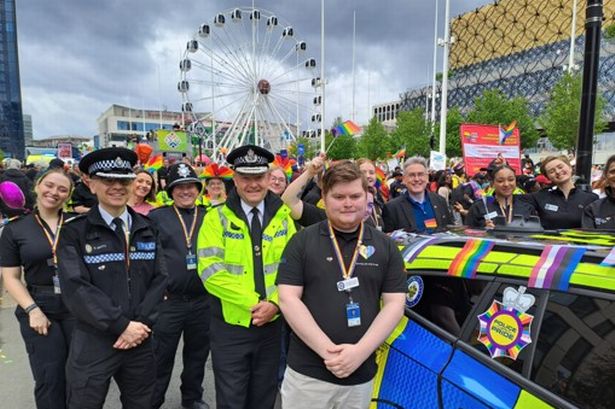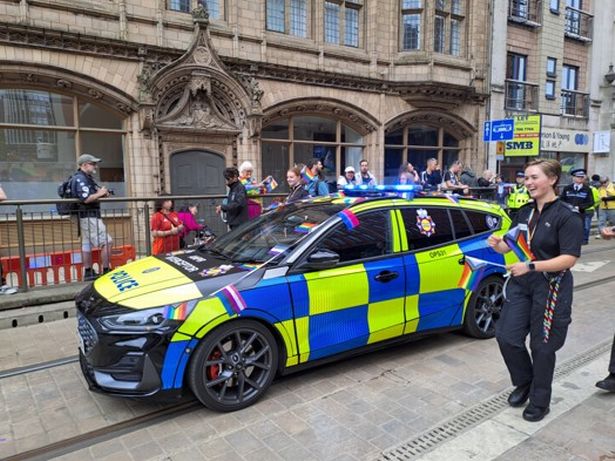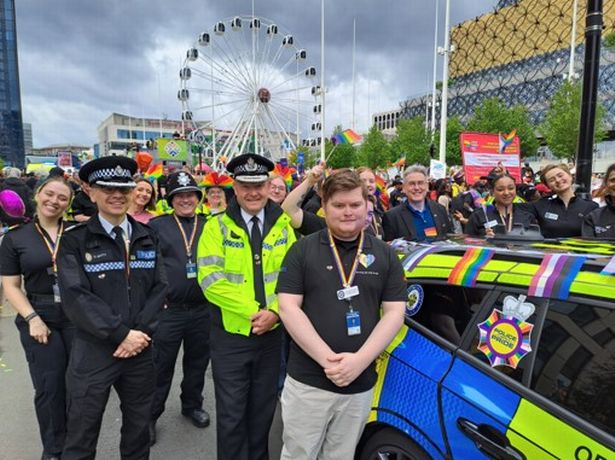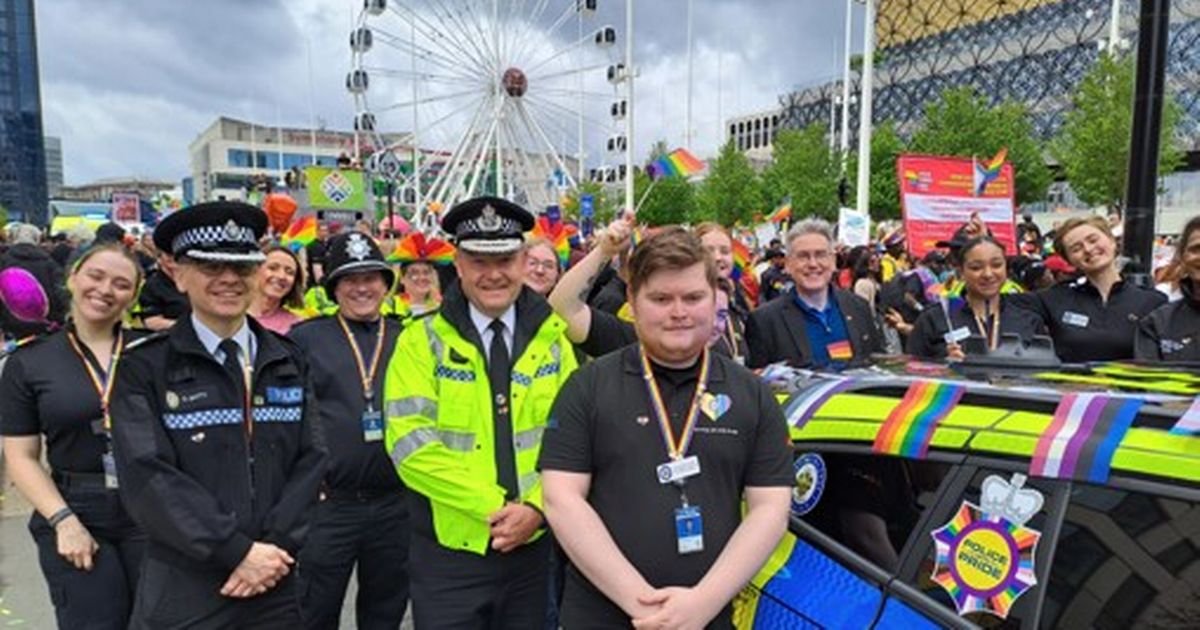The role of police at Pride events is in the spotlight after a high court ruling. Now Birmingham Pride organisers have spoken up Police chief constable Craig Guildford and force police and crime commissioner Simon Foster, Labour, with LGBTQ officers and allies at Birmingham Pride 2025. The force is not welcome next year.(Image: West Midlands Police)
Police chief constable Craig Guildford and force police and crime commissioner Simon Foster, Labour, with LGBTQ officers and allies at Birmingham Pride 2025. The force is not welcome next year.(Image: West Midlands Police)
The organisers of Birmingham Pride have banned uniformed West Midlands Police and senior officials from marching alongside the city’s gay communities at the landmark annual celebration.
The move came after they claimed Chief Constable Craig Guildford had repeatedly refused to apologise for historic injustices towards the LGBT community. Around half of police force chief constables, including the Metropolitan Police, have done so.
Future relations between the Pride movement and police forces came under the spotlight earlier this month when the High Court ruled that Northumbria Police had been wrong to allow the force to be directly involved because it was deemed ‘political’.
READ MORE: Stunning Birmingham Pride 2025 pictures as celebrations kick off in city centre
As a result its staff have been ordered not to attend and rally in uniform or police-identifying clothing. Other forces are reviewing their position on the issue but are likely to follow suit.
Lawrence Barton, director of Birmingham Pride, made a statement at the weekend announcing a decision to act. He said the Pride committee had considered but resisted calls for a full ban on any police officers attending.
But he said for too long the police had used Pride events to proclaim solidarity with the LGBT community and to celebrate inclusivity without being willing to reflect on the force’s previous actions.
In a LinkedIn post making the announcement, Mr Barton wrote: “I have always believed that people should be able to march and be included, regardless of where they work. This is especially true for LGBT+ officers who serve in our police forces.
“I recognise how upsetting and disheartening this moment is for many of them. Their identity and service deserves to be acknowledged and respected.
“But the issue is much wider than any individual officer. Pride is not just a celebration. It is a movement rooted in protest, in lived experience and in truth.”
 West Midlands Police were typically part of the Pride march through Birmingham – not any more
West Midlands Police were typically part of the Pride march through Birmingham – not any more
He described the relationship between West Midlands Police and the LGBTQ+ community as one rooted in ‘trauma, mistrust, and in too many cases, abuse.’
“This is not simply about the law as it once stood. It is about how that law was used, through acts of entrapment, harassment, and systemic discrimination that caused real harm. I have heard these stories first-hand, from people I know and from within our wider community. They stay with me.”
West Midlands Police has rejected calls for an apology multiple times, including three times since 2020. The most recent bid was made earlier this year.
Mr Barton said: “The Chief Constable declined to do so. I do not accept that position. Without acknowledgement, there can be no meaningful reconciliation.
“We can and should create space for change, and we are willing to work with institutions that show genuine commitment. However, if those efforts are not forthcoming, there is only so much we can do.
“Our Head of Inclusion put it plainly and powerfully: “We can give them chances and help facilitate change, but if they are not willing to acknowledge historic failings, there is only so much we can do.” I agree entirely.”
Mr Barton said: “Police forces are public institutions, and they carry political and social weight. Our approach must reflect that reality with honesty and integrity. “This is not about exclusion. It is about accountability, consistency, and staying true to the purpose of Pride.
“As we move into the next chapter of Birmingham Pride, our focus will remain on creating a space that is community-led, inclusive, and unafraid to challenge systems that still fall short. This is a chance for us to unite around shared values and to build something stronger, together and on our terms.”
At the 2025 Pride march, held in May, Mr Guildford stood alongside officers, police and crime commissioner Simon Foster and LGBTQ colleagues. A police car with the rainbow and trans flags was part of the parade.
 (Image: West Midlands Police)
(Image: West Midlands Police)
Veteran LGBTQ+ rights activist and human rights campaigner Peter Tatchell previously said he was “forcibly ejected” from Birmingham Pride parade for criticising past institutional homophobia by the police.
Tatchell, who has been campaigning for apologies from police forces across the UK for past actions unfairly targeting gay, lesbian and trans people, gave a speech at the start of the 2024 event which called out West Midlands Police’s behaviour while carrying a placard that read: “West Midlands Police refuse to apologise for anti-LGBT+ witch-hunts. SHAME! #ApologiseNow”.
He claimed he was ‘forcibly ejected’ by officers as a result. He said at the time: “In the 1970s and 80s, West Midlands officers arrested thousands of gay and bisexual men for consenting, victimless behaviour. They were one of the most viciously homophobic police forces in the country, with arrest figures way above the national average.
“West Midlands Police apologised in 2020 to the black community for its history of racism. Why are they refusing to say sorry to the LGBT+ community for similar abuses? This smacks of homophobic double standards.”
At the height of the Aids crisis in the 1980s, when hundreds of gay men were suffering agonising deaths, often in secret, the then-Chief Constable of Greater Manchester Police James Anderton denounced gay people as “swirling in a human cesspit of their own making”.
READ MORE: Stunning Birmingham Pride 2025 pictures as celebrations kick off in city centre
Greater Manchester Police and the West Midlands force are among those which have refused to apologise, claiming there was no evidence of anything that justified an apology or that any claimed wrongdoing happened too long ago to matter.
That’s not the stance taken by 21 out of the 45 chief constables in the UK, including the Metropolitan Police, Merseyside and Police Scotland, who have done so.
We have contacted West Midlands Police for comment.
